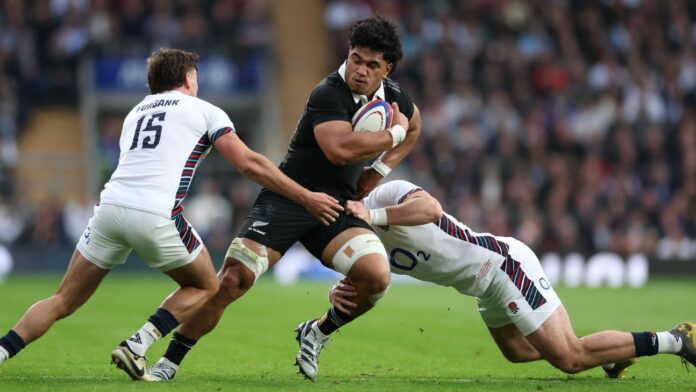
[ad_1]
Hand Wallace Sititi the World Rugby Breakthrough Player of the Year gong now.
The All Blacks have held something of a mortgage on the popular world breakthrough award, with silky wing Mark Tele’a and elusive fullback Will Jordan claiming the accolade in two of the last three years.
Italian fullback Ange Capuozzo (2022) and classy French playmaker Romain Ntamack (2019) are other recent recipients.
Sititi is surely set to join that illustrious company after surging onto the Test scene in the past four months.
A man of the match effort at Twickenham last weekend, as the All Blacks pulled off a third great escape this year against England to carry confidence onto Dublin this week, is merely the latest example of Sititi’s impact.
Northern viewers may only now be awakening to Sititi’s rapid emergence but anyone who witnessed him deliver one of the great Super Rugby performances, in the Chiefs semifinal victory over the Hurricanes this year, is well aware of his captivating brilliance.
Michael Steele/Getty Images
It was, after all, that match which propelled Sititi past Super Rugby MVP Hoskins Sotutu and into Scott Robertson’s maiden All Blacks squad.
Robertson has ushered 10 rookies — Cortez Ratima, Billy Proctor, George Bell, Pasilio Tosi, Harry Plummer, Sam Darry, Noah Hotham, Peter Lakai and Ruben Love — into the All Blacks this year. None, though, come close to matching Sititi’s influence.
It’s staggering to step back and consider Sititi made his Super Rugby debut this season with the Chiefs after being lured from Blues country. He was eased in off the bench but finished the year owning the starting No. 8 duties.
The All Blacks adopted a similar approach by injecting Sititi off the bench for his debut against Fiji in San Diego in July — and used him in the same role, for all of 15 minutes, in the loss to Argentina in Wellington.
Sititi wasn’t selected for the All Blacks defeat against the Springboks at Ellis Park and, only through injury to Ethan Blackadder, was he promoted to start in the largely unfamiliar blindside brief the following week in Cape Town.
With a standout performance against the Boks, Sititi impressed that day and in every outing since.
In the space of two months the 22-year-old has surged from unproven rookie to a mainstay of the All Blacks loose forwards for, perhaps, the next decade.
At present he is among the first names etched on Robertson’s team sheet.
Michael Steele/Getty Images
While his long-term future will undoubtedly come in his accustomed role at the back of the scrum, which will require Ardie Savea to switch to openside flanker, Sititi’s ability to thrive at blindside further underlines his value and unflappable character.
From Jordan to Tele’a, Nehe Milner-Skudder and Cam Roigard the All Blacks have unearthed many rookie gems in recent years. Sititi, though, is the best since the 2012 induction that welcomed Aaron Smith, Brodie Retallick, Dane Coles, Sam Cane and Julian Savea to the test arena.
“He’s incredible,” Robertson said of Sititi after his Twickenham performance where he ran for over 100 metres, made nine tackles, set up Tele’a for his first try with an audacious offload on the edge and could have laid on another but for Tupou Vaa’i spilling his inside pass. “He’s well above his years in maturity and just keeps stepping up and rising up.”
Sititi’s strengths come through his variety of threats. His speed off the mark is lethal from unstructured play. He’s dominant with his carry in congested contact. His lineout work is an asset for a loose forward. His fast feet at the line leave defenders clutching at air. His breadth of passing skills would make any back proud. And, having only played six Tests, he will only improve with experience.
Composed and grounded, Sititi has quickly struck a rich rhythm but it’s his temperament, his humble nature and diligent preparation Robertson alluded to, that has allowed him to handle his elevation with aplomb. Learning from Ardie Savea, the reigning World Player of the Year, helps, too.
Beyond this year, once Sam Cane moves to Japan, Sititi and Savea will continue to work in tandem, albeit with different numbers on their back, leaving the All Blacks to develop and eventually settle on a blindside to balance their long-term loose forward trio.
Editor’s Picks
This week, though, Sititi faces another new test by confronting Ireland, one of the All Blacks great modern rivals, for the first time.
Since Ireland’s maiden victory over the All Blacks under Joe Schmidt in 2016 in Chicago two of the world’s best teams have been embroiled in heated battles that have gripped the rugby world.
In the past eight years Ireland have won five Tests, the All Blacks four, to illustrate the close nature of their contests. Two years ago Ireland claimed their first series success in New Zealand – one that cost two All Blacks assistant coaches their jobs.
The All Blacks triumphed in the 2019 and 2023 World Cups to extend Ireland’s inability to progress beyond the quarterfinal and cast a cloak of green-midst revenge over this weekend’s rematch.
Both teams are injury hit, with the All Blacks missing senior figures Codie Taylor and Beauden Barrett, and Ireland without starting tighthead prop Tadhg Furlong.
The All Blacks lost their last two ventures to Dublin, in 2021 and 2018. If they are to inflict more hurt on Irish hearts and emerge victorious from their toughest northern tour test, Sititi’s talent will be front and centre.
[ad_2]
Copyright for syndicated content belongs to the linked Source link

